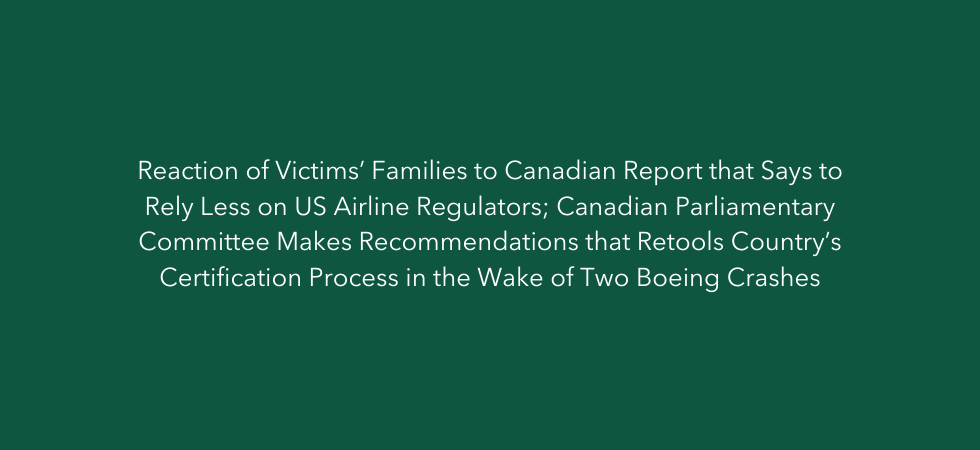Reaction is swift from victims’ families regarding the report that was released Wednesday, June 9, 2021, from Canada’s House of Commons Transport Committee that recommended Transport Canada Civil Aviation (TCCA), the country’s aircraft certification agency, conduct a full recertification for any flight system that tacks on a new or altered component.
The report, coming in the wake of the crash of two Boeing 737 MAX aircraft that killed all 346 on board including a number of Canadians in the second crash in Ethiopia, states 14 recommendations that include considering incorporating pilots into aircraft certification and pursuing further technical assessment even after the Federal Aviation Administration (FAA), the U.S. regulatory agency, certifies a plane. The 737 MAX had a new software system, MCAS, that was unknown to pilots despite its recertification.
Chris Moore of Toronto who lost his 24-year-old daughter Danielle in the second crash in Ethiopia said, “The Study shows that there are several gaps in oversight in the validation process and it is largely due to the fact that the harmonization agreement, or IPA, is based on trust. When that trust is broken by the Certifying Authority through a lack of transparency and errors on their part, the Validating Authority is essentially rubber-stamping a product that is not airworthy. We need authorities that are trustworthy and planes that are airworthy. David Turnbull [Transport Canada’s Director of National Aircraft Certification] said the process is scalable, but if TCCA does not have the information to do a technical validation then scaling nothing still leaves you with nothing… and that’s how MCAS was overlooked by TCCA.
“There are several questions asked in my testimony that were not discussed in the Study or went further in to detail. The main logical failure here is ‘Why the B737 MAX was allowed to fly after JT 610 [first] crash?’ The EAD issued by FAA and the memory aid issued by TCCA essentially states, ‘We know this plane is unsafe, but the pilot should be able to manage,’ even though the pilots were not trained on the mode of failure or had knowledge of the MCAS.
“We were told by Turnbull that after JT 610, they ‘didn’t have all the information’ – that’s sorta the point that’s lacking here. If TCCA does nothing until it has all the facts, then why let the B737 MAX fly when all the facts are not in. Had any of the authorities exercised caution and the full extent of their authority instead of waiting for the other to blink, I would not have to be answering questions to the media about aviation – a subject of which I knew very little two-plus years ago.” Moore and Paul Njoroge of Toronto who lost his entire family – his wife, three children and mother-in-law — testified in Canada before the House of Commons transport committee on Nov. 24, 2020.
Njoroge said of the Report: “It is apparent that the Canadian authorities through continued use of outdated validation procedures, negligently participated in the murder of my wife, our three children, my mum-in-law and 152 other people in the crash of Flight ET302. For a long time, we have wondered why the Ministry of Transport did not demand the grounding of the 737 Max planes in Canada after the first 737 Max crash. The former Minister was always adamant that the plane was deemed fit to fly. He lied to the victims’ families and the Canadian public that TCCA was not aware of the TARAM report. To me, it is clear that Canada was complacent with the FAA’s decisions before and after the first crash. I commend that House of Commons for the thorough investigation. I agree with their recommendations to ensure independent and deeper validation procedures of aircrafts in Canada.”
Michael Stumo of Massachusetts who lost his daughter Samya Rose Stumo in the Boeing crash in Ethiopia said, “TCCA was a paper shuffling agency, despite its claims of rigor, thumbing through Boeing 737 MAX technical documents delivered by an FAA which had been captured by, and lied to by, Boeing, which in turn is inexplicably allowed to self-certify design safety compliance in the United States. Canadian airline passengers will not be safe unless TCCA does its job of independently verifying new aircraft designs rather than merely transmitting the mistakes of the U.S. to Canada through laziness and deference disguised in complicated process-speak.”
Javier de Luis who lost his sister in the March 10, 2019, crash in Ethiopia reacted to the news out of Canada: “The FAA used to be the gold standard in aircraft certification. Other certifications authorities willingly followed their lead, knowing that the FAA high standards had allowed the unprecedented growth in worldwide air travel to occur while simultaneously increasing safety. Those days are long gone. Information that has become public since the two 737 Max crashes has clearly shown an agency that always defers to the wishes of Boeing on matters large and small. The recently passed legislation that was signed earlier this year, if properly implemented, will help reverse this decline, but it will take a long time before the FAA recovers the confidence of the aviation community.”
Robert A. Clifford, founder and senior partner at Clifford Law Offices in Chicago and Lead Counsel in the litigation against Boeing in the crash of ET302, said, “The world is beginning to realize the weaknesses of the FAA and how Boeing had the ability to easily deceive the agency. It is a tragedy that it took the loss of so many lives for the truth to be uncovered instead of a company doing the right thing.”
For further information, please contact Clifford Law Offices Communications Partner Pamela Sakowicz Menaker at 847-721-0909 (cell).

